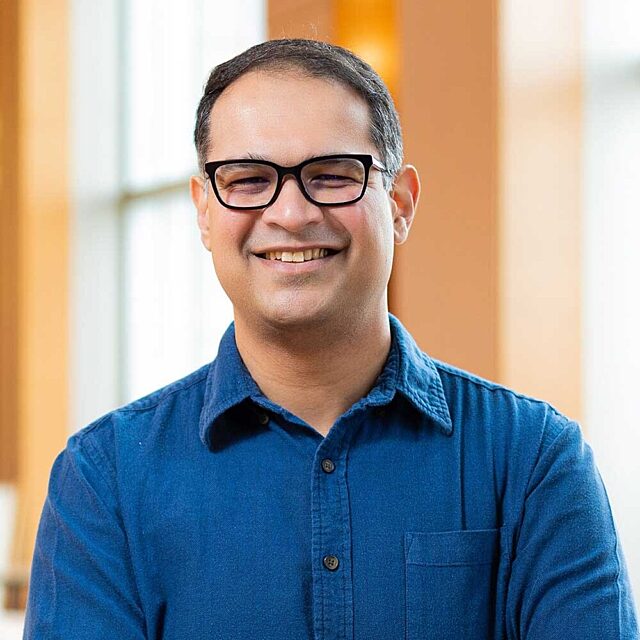News

03 July 2024
Ageless Animals
What can we learn from animals that are “immortal”? Stowers scientists are trying to find out.
Read Article
B.Sc, Chemistry, Fergusson College, University of Pune, India
M.S., Biochemistry, Utah State University, Utah
Ph.D., Microbial Biology, Rutgers University, NJ

Bacteria, working collectively, perform remarkable tasks that shape life on Earth.
Research Areas
Molecular and Cell Biology, Genetics and Genomics, Microbiology, Bacterial Community Development
Courses Taught
Prokaryotic Biology; Genetics; Laboratory Rotation; Thesis Laboratory
Honors
2024-2026
Junior Editorial Board at mBio, an ASM journal
2019-2022
LSRF-HHMI Postdoctoral Fellow
2014-2017
Douglas. E. Eveleigh Graduate Fellowship
2012
Robert S. and Eileen A. Robison Scholarship Award for Excellence in Graduate Studies
2012
Hamo Hachnasarian Scholarship Award
Ameya Mashruwala, Ph.D., is a bacterial biologist and geneticist, and will join the Stowers Institute in January 2024 as an Assistant Investigator. Mashruwala’s research involves understanding the development and function of bacterial communities.
Mashruwala received a B.Sc. in chemistry from Fergusson College, Pune in India, before moving to the United States to pursue an M.S. in biochemistry at Utah State University, followed by a Ph.D. in microbial biology at Rutgers University in the lab of Jeffrey Boyd, Ph.D.
During his predoctoral work, he became fascinated by the concept that bacteria can assemble into multicellular communities where, working together, they can accomplish feats beyond the capabilities of individual bacterial cells. This enables bacteria to shape life on Earth, from the atmosphere to geology to human health. This fascination with bacterial collectives led Mashruwala to pursue his postdoctoral studies at Princeton in the lab of Bonnie Bassler, Ph.D., a pioneer in the study of quorum sensing and bacterial communities.
His postdoctoral work included the discovery of a new group trait in bacteria called regulated cell death (RCD). This bacterial behavior occurs in distinct spatial and temporal patterns and bears a striking resemblance to programmed cell death in multicellular organisms, where this process is well understood and is known to aid organismal development. This discovery suggests that bacteria, the earliest life forms on earth, developed multicellular-like programs before eukaryotes arrived.
At the Institute, the Mashruwala Lab will seek to understand social behaviors and community development in bacteria. The research will focus on uncovering the molecular underpinning’s of bacterial regulated cell death. The team will employ an interdisciplinary approach, encompassing genetics, high-throughput imaging, computation, and molecular biology. Mashruwala hopes that understanding this evolutionarily ancient behavior in bacteria will help reveal clues to guide studies of cell death in humans and uncover possibilities for new therapeutics that influence human health and curb infectious diseases.
Beyond the research, Mashruwala is committed to mentoring and empowering the next generation of scientists. He envisions an inclusive, diverse, and stimulating work environment that fosters a free exchange of ideas and stimulates innovative research. He is excited to collaborate with his team members to achieve these goals.
Mashruwala, A. A., Qin, B., & Bassler, B. L. Cell. 2022 Oct 13;185(21):3966-3979.e13
Mashruwala, A. A., and Bassler, B. L. 2020. mBio, 11(4), e01572-20.
Qin, B., Fei, C., Bridges, A. A., Mashruwala, A. A., Stone, H. A., Wingreen, N. S., and Bassler, B. L. 2020. Science, 369(6499), 71–77.
Mashruwala, A. A., Guchte, A. V., and Boyd, J. M. 2017. eLife, 6, e23845.
Mashruwala, A. A., Bhatt, S., Poudel, S., Boyd, E. S., and Boyd, J. M. (2016). PLOS Genetics, 12(8), e1006233
Mashruwala, A. A., Roberts, C. A., Bhatt, S., May, K. L., Carroll, R. K., Shaw, L. N., and Boyd, J. M. (2016). Molecular Microbiology, 102(6), 1099–1119.